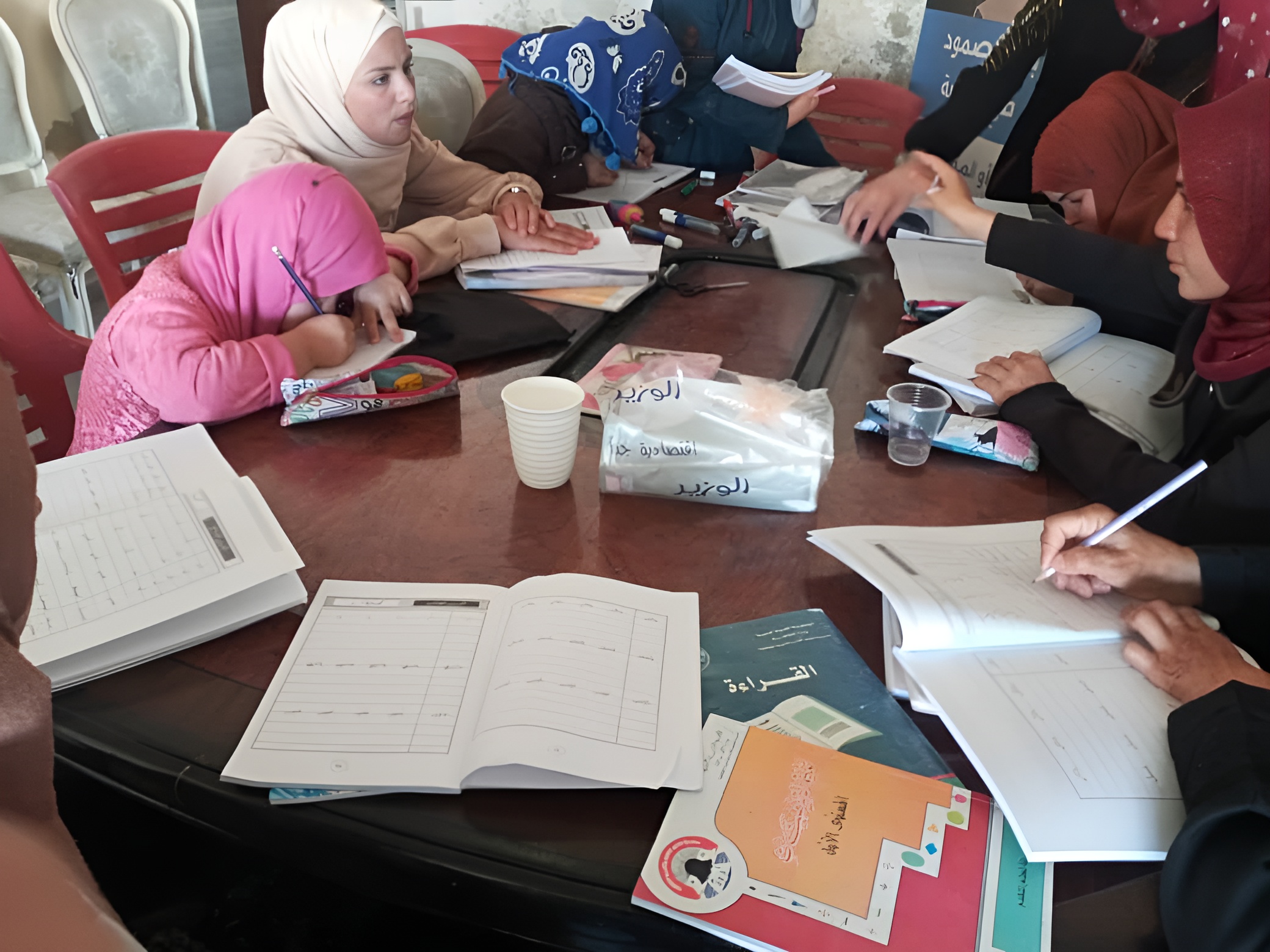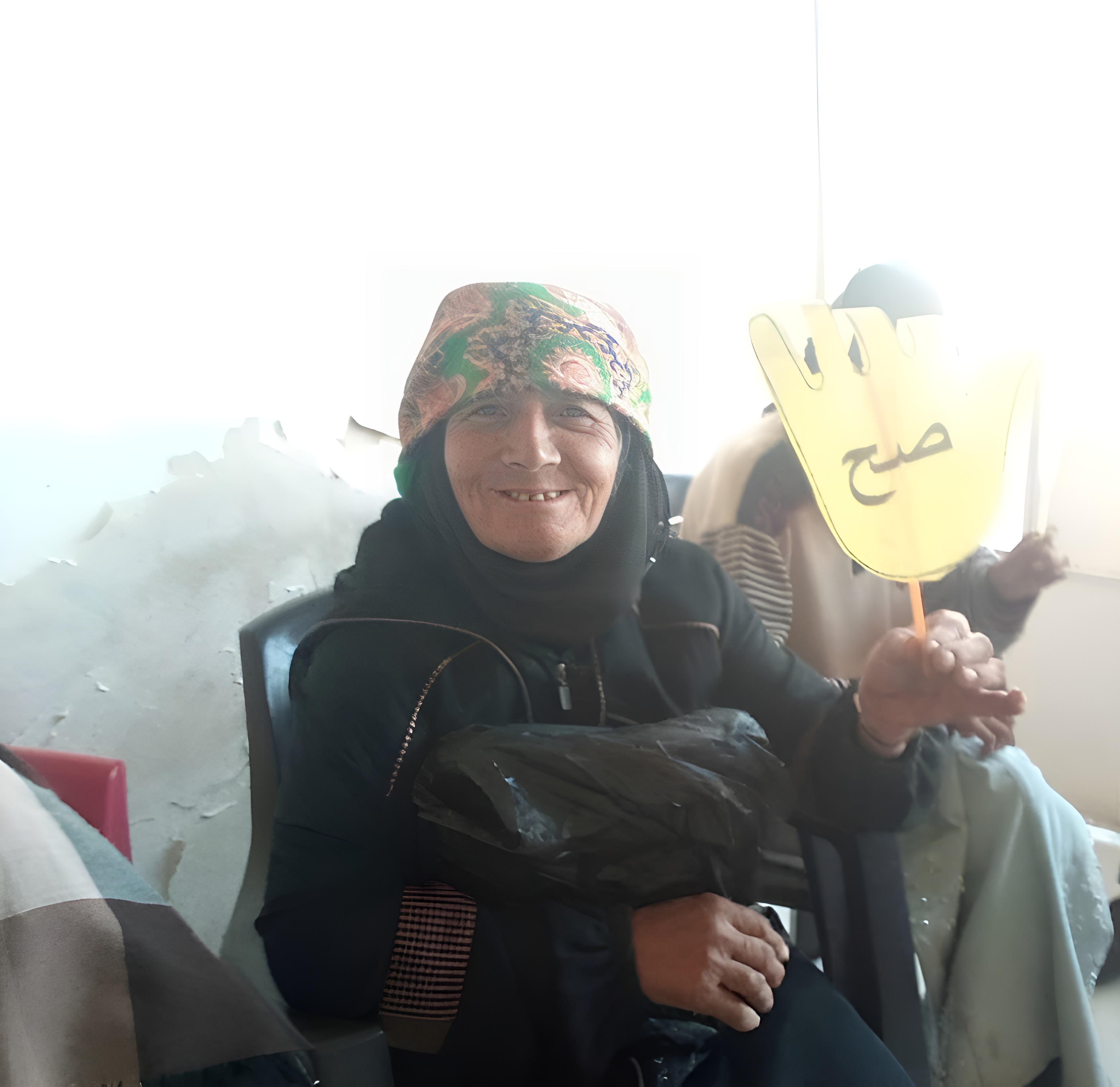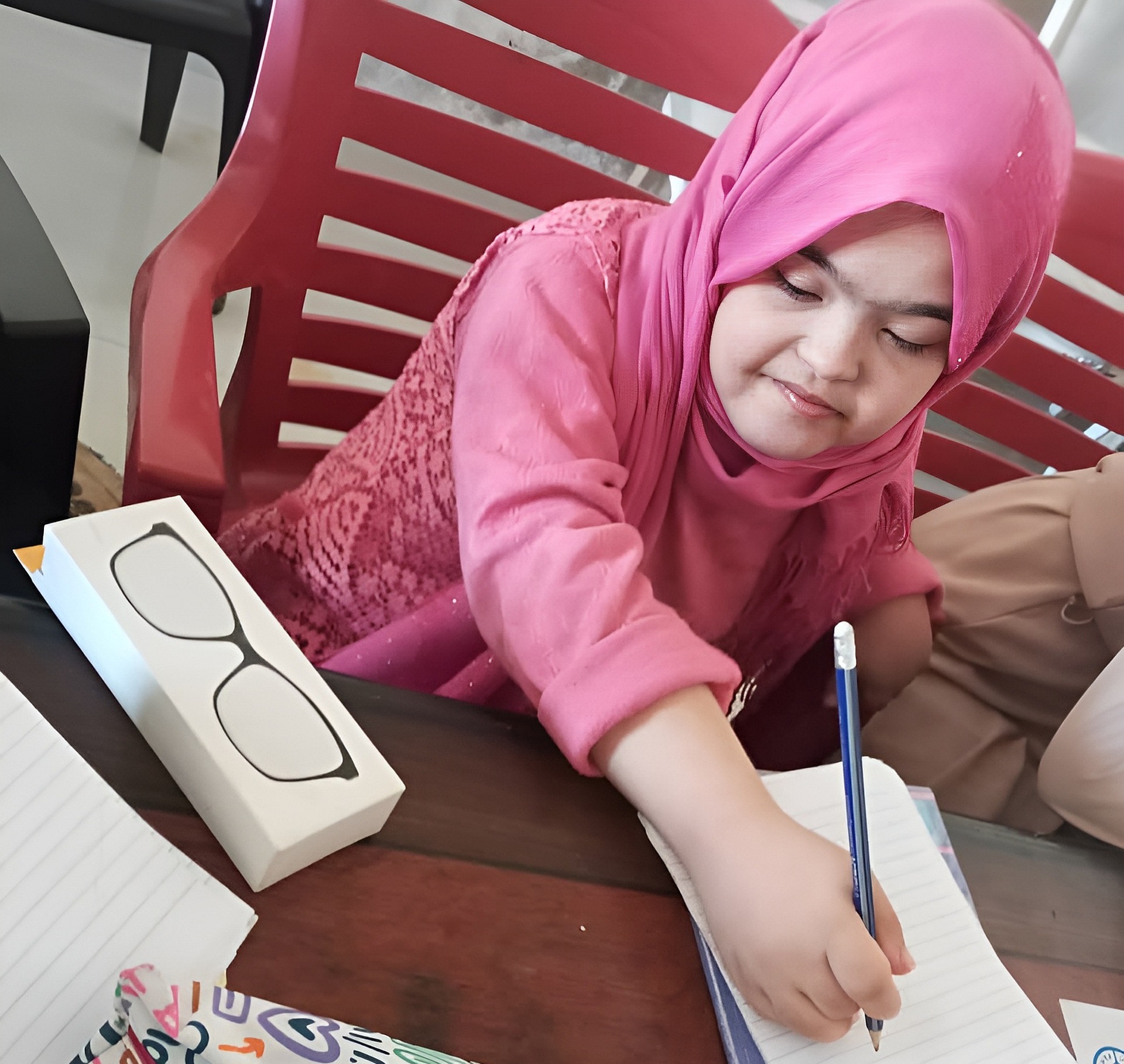
"Innovating for Inclusion: Empowering People with Disabilities in Agrifood Systems”
Nada Jaafer is a participant in the literacy initiative in Taldahab Village, Homs Governorate
© FAO/ Sabri ElKhodur, Dimitra club focal point
22/10/2024
The Food and Agriculture Organization of the United Nations (FAO) Science and Innovation Forum (SIF) 2024, held from 14 to 18 October, brought attention to the transformative power of innovation and inclusion within agrifood systems in the Near East and North Africa (NENA) region, focusing on the transformative role of innovation in agricultural practices. The theme "Inclusive Science and Innovation for Agrifood Systems Transformation, Leaving No One Behind," emphasized FAO’s regional focus on empowering vulnerable groups, including people with disabilities (PWD), through inclusive approaches in agriculture and social development.
This year, the NENA region's contributions to inclusive agricultural development were recognized, mainly through FAO’s Farmer Field Schools (FFS) in Syria and Egypt, which have played a crucial role in integrating PWD into farming activities. The FAO Innovation Award honoured a remarkable achievement from Syria, where a local farmer's innovation drives change in rural agrifood systems.
Empowering People with Disabilities through FAO’s Farmer Field Schools
Rural women with disabilities face compounded barriers because they experience overlapping forms of discrimination based on both their gender and their disability; they have limited access to resources, such as land and property rights, financial services, and agricultural inputs. Due to their vulnerability and social and cultural stigma, they are excluded from decision-making, workforce and other economic activities, education, skills development, and meaningful participation in agrifood activities. FAO works to address these challenges by integrating a gender and disability-sensitive lens in its programs to ensure interventions address the unique needs of rural women with disabilities. The interventions include working on building resilience to climate change, food insecurity, and economic shocks, such as accessible climate-smart agriculture practices in FFS, promoting gender equality, participation in decision-making, and capacity building.
Through work by FAORNE, the farmer field schools have played a pivotal role in supporting local innovation and disability inclusion. Notable examples include Abdullah Tobal, a Syrian farmer from Tal Hasel, Aleppo, who developed a hay baling machine that revolutionised fodder production in his community, earning him the FAO Innovation Award. This technology, created within the FFSs framework, not only enhanced livestock farming but also demonstrated how disability-inclusive practices can foster resilience in post-conflict areas.
Meanwhile, in Egypt’s Western Desert, FAO’s FFS for Deaf and Mute Farmers in Kharga Oasis provided tailored agricultural training, empowering farmers with disabilities to succeed in the date palm sector. These initiatives exemplify how FAO creates opportunities for PWD to contribute to their communities and improve their livelihoods.

Amina Esber, a mother of a disabled son, a participant in the literacy initiative in Taldahab Village, Homs Governorate Photo: © FAO/Nermeen AlHomsi, Dimitra club facilitator.
Integrating PWD in Violence Prevention and Community Engagement Initiatives
Beyond agriculture, FAO is also implementing innovative projects that tackle Violence Against Women and Girls (VAWG), focusing on disability inclusion. In Syria, FAO’s Building Local Resilience in Syria (BLRS) project includes two pilot initiatives aimed at preventing VAWG at both the household and community levels. These initiatives integrate people with disabilities into activities designed to challenge discriminatory social norms and economic violence, ensuring their active participation in transforming gender relations.
Through Dimitria Clubs (DCs), an inclusive community engagement modality, women with disabilities are empowered to participate in economic and social literacy initiatives. In Taldahab village, a conservative rural community in Homs, five women with physical and mental disabilities are participating in an economic literacy project designed to increase their financial independence and integration into society.
The FAO integrates gender-based violence (GBV) risk mitigation into its programs for rural men and women with disabilities through comprehensive, inclusive, and community engagement approaches. Gender-related topics on social inclusion for PWDs have been included in FFS and Dimitra Clubs. The project works towards preventing GBV during Dimitra Clubs activities by conducting joint GBV campaigns in partnership with UNFPA. The facilitators sensitize the local communities on GBV, including forms of GBV like economic violence against women and girls and early marriage. The sessions focus on the most vulnerable groups, such as PWDs, and 2221 community members have participated in the two pilots. FAO is activating the role of opinion leaders and influencers to be real allies to prevent GBV and build their capacity to speak out against GBV. The program trained 201 opinion leaders and influencers in Homs and rural Damascus on GBV awareness. Additionally, FAO responds to GBV disclosure cases and refers them to the UNFPA implementing partner to receive the GBV specialized services.
In addition, women play a critical role as the caretakers in families. Often, women bear most of the burden of care, including when other members of the family are living with disabilities. Engaging women, therefore, impacts family members with disabilities. Empowerment of the PWDs, in turn, can reduce the burden of care for the women.
Amina Esber, a 60-year-old widow with a disabled son, shared her experience: “I have a young man with a disability; everything I have learned here, I will teach him again because he has to go out and get the house’s supplies. Now, he knows how to count money and buy things.”

Nada Jaafer is a participant in the literacy initiative in Taldahab Village, Homs Governorate Photo: © FAO/ Sabri ElKhodur, Dimitra club focal point
Nada Jaafer, a 20-year-old woman with a mental disability, regularly attends two literacy courses to further her education, driven by a deep passion for learning. Her mother explained, “The goal of my daughter participating in this course is to integrate her into society.”
These efforts reflect FAO’s commitment to addressing the root causes of social and economic exclusion while actively working to build more inclusive and resilient communities. It aligns with FAO’s broader gender strategies and global gender policy, ensuring that interventions addressing the challenges of rural women with disabilities are integrated into its overall approach to empowering marginalized populations. By addressing these issues through the lens of the Sustainable Development Goals (SDGs), particularly SDG 5 (Gender Equality) and SDG 10 (Reduced Inequalities), FAO fosters an inclusive environment where no one is left behind, and all individuals can contribute to and benefit from sustainable development. In addition, by including PWD in these transformative activities, FAO ensures that all vulnerable groups, regardless of gender, age, or disability status, can contribute to and benefit from agrifood systems and broader societal development.
Innovation as a Tool for Inclusive Growth
The SIF 2024 highlighted the importance of scaling up innovations that enhance agricultural productivity and foster social inclusion. The initiatives in Syria and Egypt underscore how localised, community-driven innovations can address broader challenges. FAO’s commitment to leveraging innovation for disability inclusion serves as a model for creating equitable agrifood systems across the NENA region.
By empowering PWD through agricultural and social innovations, FAO demonstrates the power of inclusive approaches in achieving sustainable development goals. The success stories from Syria and Egypt illustrate the profound impact that targeted interventions can have in creating opportunities for marginalized groups, improving food security, and building resilient, adaptive communities in the face of economic and social challenges.
As the NENA region continues to navigate complex issues of conflict recovery, food insecurity, and social inequality, the examples presented at SIF 2024 offer a clear path forward: innovation must be inclusive to drive meaningful, lasting change.
